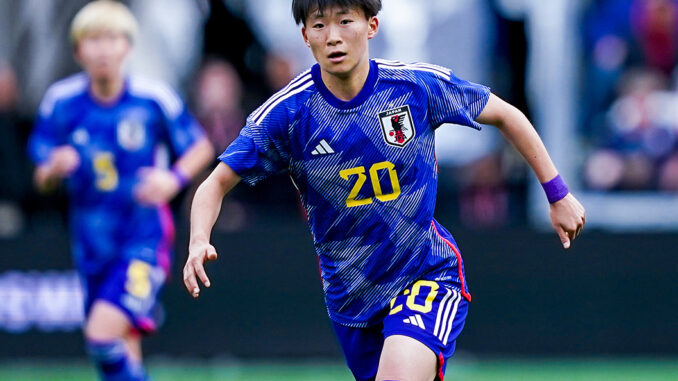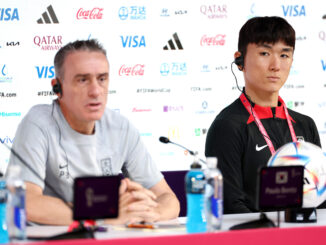

Japan has long been a prime producer of top technical talent in the women’s game.
However, the 2011 world champions have struggled to maintain pace with the elite of women’s football in recent years and something of a gap has opened up between those at the top and Nadeshiko. At the FIFA Women’s World Cup 2023, promising young forward Aoba Fujino could go some way to bridging that gap.
Fujino, 19, predominantly plays as a wide forward on the right flank. With the ball at her feet, she will either opt to either cut inside and directly advance on goal, or run the ball to the byline before playing in a teammate.
She is able to shoot with both feet and is clinical from close range or from distance. For both club and country, Fujino occupies the position as the right-sided forward of a front three, a role that appears to utilise her pace and technique to maximum effect.
A product of the elite Tokyo Verdy Menina youth academy, the 2022/23 WE League season has been nothing short of a breakout one for the 19-year-old forward as she notched 17 goals from 28 appearances in all competitions.
She averages an xG of 0.42 per 90 and is proving efficient in chance creation with an xA of 0.26 coupled with 74.9% passing accuracy.
Whilst Fujino is a recent bloomer at club level, Nadeshiko boss Futoshi Ikeda is a long admirer of her talents.
At the 2022 U20 Women’s World Cup she played a crucial role in Japan’s progress to the final and went on to start six of the nine senior matches that have been played since. The former Urawa Reds’ man’s faith in the youngest seems unwavering and the evidence suggests Fujino is firmly in his starting eleven plans moving forward.
Is Ikeda’s early commitment to the fresh-faced up-and-comer justified? For a variety of reasons, it seems so.
Japan’s possession brand of football is the means by which they dominate the ball and ensure the game is played in their opponent’s half. But all too often the 2011 world champions fail to unlock competent defensive structures and struggle to arrive at an end product. Seemingly an alternative path to goal would go a long way here.
Along with intricate passing combinations, Japan focus on individual player movements as a method of opening up defenses and creating space for goal scoring opportunities.
Fujino is a natural at this and is often seen dragging defenders out of position by drifting inside and out while Japan progress through the lines. She may also dart forward on a decoy run while the ball carrier shifts play to the opposite flank, rendering the opposition defense exposed and unstable.
There is also a combative nature to her game that is not often found in Japanese players. She has a short but stout stature and will often run at players and attempt to fearlessly barge her way through with the ball at her feet.
In instances where this proves unsuccessful, she has a reasonable chance of winning a foul in a dangerous area, while she is also relentless in recovery and has a natural flare for pressing actions.
She also plays a crucial role when Japan lose possession high up the pitch.
Systematically, Japan will seek to win the ball back by blocking the passing lines and squeezing the space around the ball carrier. The closest of the three forwards will move to engage with the ball usually reclaimed after a misplaced pass is forced.
Fujino posts solid numbers for Japan boasting an impressive 81.3% opposition half recoveries success rate for the 2022/23 season, the highest amongst her frontline cohort heading to this World Cup.
Committing so many numbers forward will inevitably leave Japan vulnerable to rapid counter-attacks. Defending at source will be of paramount importance given that Japan lacks the physical superiority for one-on-one duels. Whether it’s with a well-timed tackle or an instinctive interception to recover the second ball, Fujino is proving to be of critical importance for frontline defensive work.
Attacking fluidity alone is proving insufficient in Japan’s attempt to return to more prosperous times. Aoba Fujino offers that all-important variation to this Japan side with no better place to showcase it than the grand contest of women’s football.
The stage is set.
Photo: Japan Football Association
Listen to the latest episode of The Asian Game Podcast




